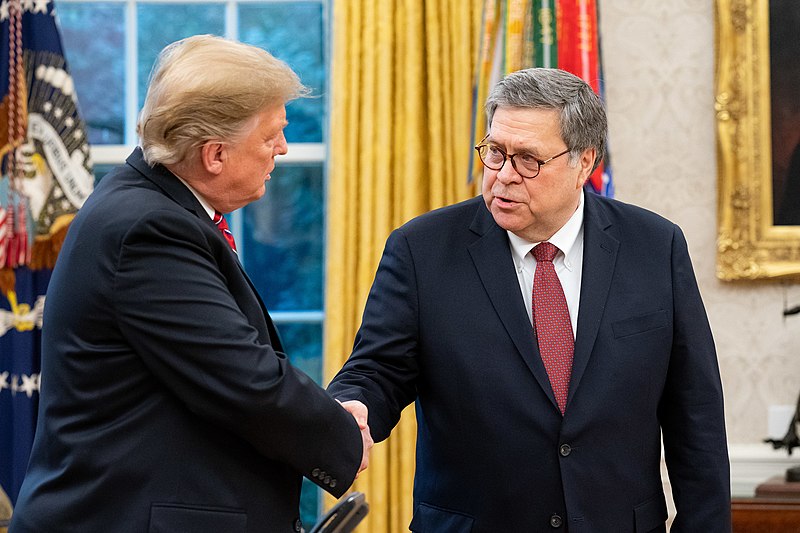Trump’s Department of Justice is asking Congress to allow the attorney general to indefinitely detain people without trial in violation of the constitutional right of habeas corpus, writes Marjorie Cohn.

President Donald Trump and Attorney General William Barr in 2019. (Wikimedia Commons)
 Throughout U.S. history, presidents have exploited national emergencies to exceed their constitutional powers. Abraham Lincoln illegally suspended habeas corpus during the Civil War. Franklin D. Roosevelt confined people of Japanese descent in internment camps during World War II. And George W. Bush used his post-9/11 “war on terror” to launch two illegal wars, mount a program of torture, conduct extensive unlawful surveillance and illegally detain people.
Throughout U.S. history, presidents have exploited national emergencies to exceed their constitutional powers. Abraham Lincoln illegally suspended habeas corpus during the Civil War. Franklin D. Roosevelt confined people of Japanese descent in internment camps during World War II. And George W. Bush used his post-9/11 “war on terror” to launch two illegal wars, mount a program of torture, conduct extensive unlawful surveillance and illegally detain people.
In light of the national emergency Donald Trump declared on Friday, March 13, his Department of Justice (DOJ) is asking Congress to allow the attorney general to indefinitely detain people without trial in violation of the constitutional right of habeas corpus. The DOJ also seeks to hold hearings without the defendant’s consent and exclude anyone with Covid-19 from eligibility for asylum.
Trump, who delayed responding to the pandemic for an unconscionable period of time, has now declared himself a “wartime president.” He knows that wartime presidents are never defeated at the ballot box. Despite Trump’s incompetent handling of the crisis, his approval ratings are as high as they have ever been.
But, during Bush’s so-called war on terror, Justice Sandra Day O’Connor wrote in Hamdi v. Rumsfeld, “We have long since made clear that a state of war is not a blank check for the President when it comes to the rights of the nation’s citizens,” adding, “Even the war power does not remove constitutional limitations safeguarding essential liberties.”

Former U.S. Supreme Court Justice Sandra Day O’Connor in 2016. (Gage Skidmore, Flickr)
Trump’s Emergency Powers
In declaring the national emergency, Trump invoked the Stafford Disaster Relief and Emergency Assistance Act, which provides for financial and technical assistance to state and local governments.
He also invoked the National Emergencies Act, which triggers more than 100 additional powers for the president, constitutional law scholar Stephen Rohde said on WBAI radio’s “Law and Disorder.” They include the authority to shut down radio stations, freeze bank accounts and even deploy the military.
Moreover, the Communications Act of 1934 says that when a president proclaims there is a state or threat of war, he can order “the closing of any facility or station for wire communication.”
Rohde worries that provision could include television, radio and the internet. “It can give a president a virtual kill switch,” he told “Law and Disorder” hosts Michael Steven Smith and Heidi Boghosian. “This panoply of powers that have existed and are now at the president’s beck and call are very dangerous.”
DOJ Proposes Indefinite Detention
The DOJ is proposing that Congress grant the attorney general power to ask a district court’s chief judge to suspend court proceedings “whenever the district court is fully or partially closed by virtue of any natural disaster, civil disobedience, or other emergency situation,” documents reviewed by Politico reveal.
That authority extends to “any statutes or rules of procedure otherwise affecting pre-arrest, post-arrest, pre-trial, trial, and post-trial procedures in criminal and juvenile proceedings and all civil process and proceedings.”
This would be a violation of the right to habeas corpus, which allows people to challenge the legality of their detention in court. The U.S. Constitution says only Congress can suspend the writ of habeas corpus. “The Privilege of the Writ of Habeas Corpus shall not be suspended, unless when in Cases of Rebellion or Invasion the public Safety may require it,” reads the Suspension Clause.
Norman L. Reimer, executive director of the National Association of Criminal Defense Lawyers, sounded the alarm. “So that means you could be arrested and never brought before a judge until they decide that the emergency or the civil disobedience is over,” he said. “I find it absolutely terrifying. Especially in a time of emergency, we should be very careful about granting new powers to the government.”
The DOJ also wants to amend the Federal Rules of Criminal Procedure to allow for hearings conducted by videoconference without the defendant’s consent.
And the DOJ seeks Congress’s permission to suspend the statute of limitations for criminal and civil cases during a national emergency.
Fortunately, there appears to be strong opposition in Congress to the DOJ’s proposal. Senate Majority Leader Chuck Schumer wrote, “Two Words: Hell No;” Senator Mike Lee (R-Utah) tweeted, “OVER MY DEAD BODY;” and Representative Alexandria Ocasio-Cortez tweeted, “Absolutely not.”
Absolutely not. https://t.co/buaiiU92Xk
— Alexandria Ocasio-Cortez (@AOC) March 21, 2020
Customs Surveillance & Detention
Meanwhile, Customs and Border Protection (CBP) is planning the surveillance and detention of people suspected of having Covid-19. The agency’s internal pandemic response plan obtained by The Nation discusses quarantining detainees in tent cities at the border and coordinating with foreign and domestic intelligence agencies and the Pentagon.
“We do not yet know whether CBP will carry out surveillance, transfer and detention of individuals based actual or perceived health status,” immigration attorney Helen Sklar, a member of the executive board of the National Lawyers Guild-Los Angeles chapter, told Truthout. “We do know, however, that Immigration and Customs Enforcement (ICE) will not release immigrant detainees notwithstanding the near universal agreement among public health experts that their continued detention poses a grave danger to public health, including an elevated risk for chronic and infectious diseases such as Covid-19.”
Sklar said that ICE does not release detained immigrants for medical reasons even though it has long had the authority to do so.
Will Trump Suspend Election?
The national emergency occasioned by the Covid-19 pandemic has already led to the postponement of presidential primaries in Ohio, Kentucky, Georgia, Connecticut and Louisiana. Could Trump use his emergency declaration to suspend the November presidential election?
Not legally, as the 22nd Amendment to the U.S. Constitution limits presidents to two terms, and Congress, not the president, has the power to schedule presidential elections.
The more likely scenario is that Republican governors will erect roadblocks to discourage people from voting during the pandemic. They could “tamp down the turnout in the elections if they are not robust in providing creative and innovative solutions for how people can vote either in person with social distancing at normal polling stations or by mail,” Rohde told Smith and Boghosian.
Senator Ron Wyden (D-OR) has proposed a bill that would require states to develop plans to conduct the election in light of “the very real threat looming this November.” The Resilient Elections During Quarantines and Natural Disasters Act of 2020 would require states to furnish postage-free absentee ballots with self-sealing envelopes and provide grants worth $5 million to states to pay for postage and high-speed scanners to count ballots.
Even if Trump loses the election, however, there is a danger he might illegally declare martial law and refuse to leave the White House.
During the 2016 presidential campaign, Trump claimed the election was being rigged and refused to say he would accept the results if he lost the election.
Marjorie Cohn is professor emerita at Thomas Jefferson School of Law, former president of the National Lawyers Guild, deputy secretary general of the International Association of Democratic Lawyers and a member of the advisory board of Veterans for Peace. Her most recent book is “Drones and Targeted Killing: Legal, Moral, and Geopolitical Issues.”
This article is from Truthout and reprinted with permission.
The views expressed are solely those of the author and may or may not reflect those of Consortium News.
Please Donate to Consortium News.
Before commenting please read Robert Parry’s Comment Policy. Allegations unsupported by facts, gross or misleading factual errors and ad hominem attacks, and abusive or rude language toward other commenters or our writers will not be published. If your comment does not immediately appear, please be patient as it is manually reviewed. For security reasons, please refrain from inserting links in your comments, which should not be longer than 300 words.

Slightly off topic—Federal to state laws. In WA state, the governor has “Ordered” citizens and businesses to adhere to certain safety guidelines we are all aware of. Practical, reasonable guidelines I must add.
And yet, he is threatening fines and misdemeanors to those not complying.
Is this even legal?
Legally define “Ordered”.
Also disturbing is the “hotline” set up for citizens to rat on their neighbors and businesses purportedly not complying. Reminds one of old East Germany, where they said for every citizen there was another spying on them. This of course is without due process in a land more and more leaning towards a hysterical “guilty until proven innocent” stance.
Yes, it is legal. Authority starts with the federal government, what the federal government doesn’t govern goes to the states, what the states don’t govern goes to local government such as city council/mayor or whatever. For example, when the state government says all persons must remain at home until further notice BECAUSE we are trying to prevent the spread of COVID-19 but the local government says it’s ok to play golf and go to church the state overrides the local ordinance. If there is nothing above the local then they can make the ordinance and enforce it.
Senator Wyden has a good idea but the bill leaves enforcement to the discretion of the AG. So it is not really a law. The states can spend the $5 million on bubble gum and get away with it if the AG decides not to bring a civil action.
The President was never called into Service to assume the mantle of Commander in Chief. As such without a formal war Declaration with his formal call to Service by Congress he should be denied that power. Here specifically there may be asylum seekers who contracted Covid-19 and the President is looking to turn them away. That is unconscionable. The Continuity of Government process may also enable the President to work to detain, without trial, dissidents who do not even know they are on the list of some 8 million citizens of this country who are considered rebellious. That is a stripping of our essential rights in this country with a social compact called the Constitution with our BIll of Rights.
Wasn’t authorization for this given when the 2012 NDAA was passed by congress and signed by Obama? This is not just something that Trump has come up with. Look at what the ACLU says about this.
Typo: Senate Majority Leader Chuck Schumer wrote, “Two Words: Hell No (Minority)
BTW, American executive wants more draconian powers than those that exist in China and Iran, they really spent too much time being chummy with Saudis. Absolute monarchy is the best way to get things done, right?
A enlightened despots would be nice for a change.
I think I will invest in knee pads I see a lot of praying in the near future. As soon as I get my stimulus check?